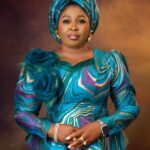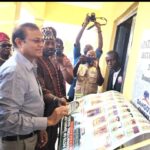By Lucy Ogalue
The Federal Government has reiterated its commitment to prioritise, promote and develop Micro, Small and Medium Enterprises (MSMEs), particularly women-owned ones in the country.
The Minister of State for Industry, Trade, and Investment, Mariam Katagum, said this at the 2023 International Women’s Day celebration organised by the Nigerian Association of Small and Medium Enterprises (NASME) on Thursday.
The News Agency of Nigeria (NAN) reports that the event has as its theme, “DigitAll: Innovation and Technology for Gender Equality”.
“Gender equity is a smart venture; however, involving women in innovation and technology is even much smarter.
“Collaboration must be done across all government, civil society, private sector and the technical community to ensure that the benefits of digital technology are equally distributed.
“Let me reiterate the commitment of the Federal Government of Nigeria to prioritise, promote and develop MSMEs, particularly women-owned businesses.
“I am optimistic that the crop of discussions and participants at this event would come up with a set of recommendations that will facilitate the deepening of innovative services.
“To the benefit of women-owned enterprises and to the benefit of the nation at large,’’ Katagum said.
According to the minister, the theme of the event is appropriate considering the current global realities where communication, transportation, healthcare and connectivity have been made better through technology.
“This event serves as an important reminder of the immense potential that the digital transformation holds for accelerating gender equality and women’s empowerment.
“But also of the risk it bears for repeating and amplifying existing patterns of gender inequality.
“As the world is becoming digital, we must ensure that we keep up with the pace and unleash the potential of women and girls to become active agents of change in this transformation,’’ she said.
While reiterating the importance of internet, Katagum underscored the need for more investments geared toward increasing women and girls digital literacy and familiarity with technology.
She said this would enable them to participate effectively in the digital economy and gain access to digital services such as education, healthcare, and online banking.
The minister recognised that women-owned enterprises had progressively increased over the years, and urged women to embrace technology and innovation in their businesses.
According to her, these technologies continue to be influential and have the potential to enhance growth and expand the opportunities for realising women’s rights in Africa.
On policy, Katagum said the President Muhammadu Buhari-led administration enacted and implemented the Nigeria Startup Act, which provided an enabling environment for the establishment, development and operation of startups in Nigeria.
“It will also facilitate development and growth of technology-related talent and position Nigeria’s startup ecosystem as a leading digital technology hub in Africa.
“It is therefore, expected that the startup act will present a partway toward creating an equal playing field for women by closing the gender gap in entrepreneurship.
“And I expect that women folk will seize this opportunity to the fullest,’’ the minister said.
Dr Abdulrashid Yerima, the President/Chairman of Governing Council, NASME, restated the association’s commitment to leverage technology to advance the cause of women in business.
“Our goal is to help women entrepreneurs overcome the barriers they face and achieve their full potential.
“We also recognise that our efforts are crucial in achieving the Sustainable Development Goals (SDG) 2030, particularly SDG 5 on gender equality.
“I want to thank everyone for being part of this event and for your commitment to promoting gender equality. Let us continue to work together to create a world where women have equal opportunities to succeed and thrive in business,’’ Yerima said.
The Chairman Board of Trustees, NASME, Ubadigbo Okonkwo, said there was growing evidence that gender inequality was a major drawback to Nigeria’s socioeconomic development.
Emphasising the need to interrogate the silent dimensions of gender inequality in Nigeria and proffer solutions, Okonkwo said sufficient women’s representation in national and state assemblies was critical.
“Multiple studies and surveys have highlighted a significant gender gap in financial inclusion and national political representation in Nigeria.
According to a recent study, financial exclusion is estimated at 36 per cent for women and 24 per cent for men, with a gender gap of 33 per cent.
“What this means is that access to money, operating a bank account, women are excluded more than men and that shouldn’t happen in these days of cashless society.
“The study found out that part of this gap can be explained by women’s loyal levels of income, education and trust in financial institutions.
“The deployment of technology and innovation particularly the digital financial services and payment platforms can contribute to the reduction of gender gap in financial inclusion,’’ Okonkwo said.
He said the just concluded Presidential and National Assembly elections on Feb. 25, demonstrated poor national political representation for women.
“Out of 360 members of the House of Representatives, the number of females remains about the same, a small increase from 13 in the 9th Assembly to 14 in the 10th. Assembly.
“It is worse in the Senate; out of 109 members, the number of females dropped from eight to three; these numbers do not do justice to the gap and inequality.
“In the House of Representatives, the 14 new female members represent less than four per cent of the 360 members.
“The three senators represent less than three per cent of the 109 senators.
“There is a serious problem in national representation, and it is difficult to mainstream and implement gender equality without sufficient representation of women in the national and state assemblies,’’ Okonkwo said.
Stakeholders, public and private sector representatives, and partners in the MSMEs sub-sector, among others attended the event. (NAN)(www.nannews.ng)
===================
Edited by Dorcas Jonah/Ese E. Eniola Williams











